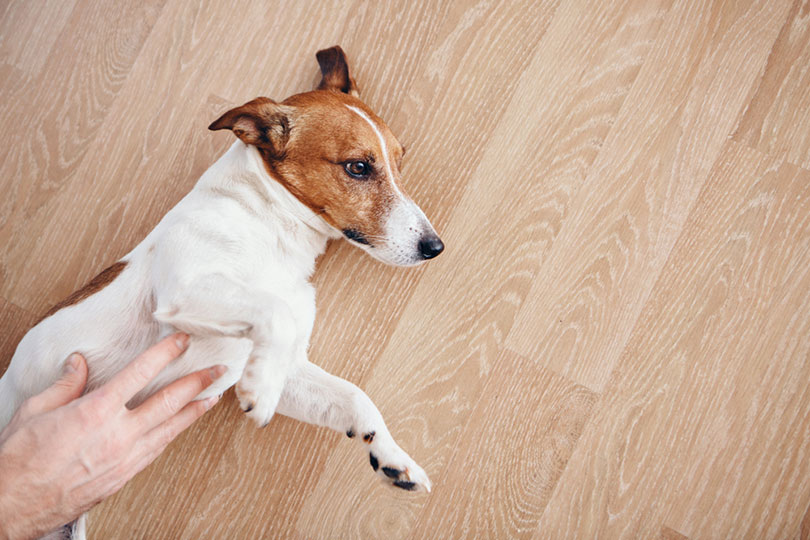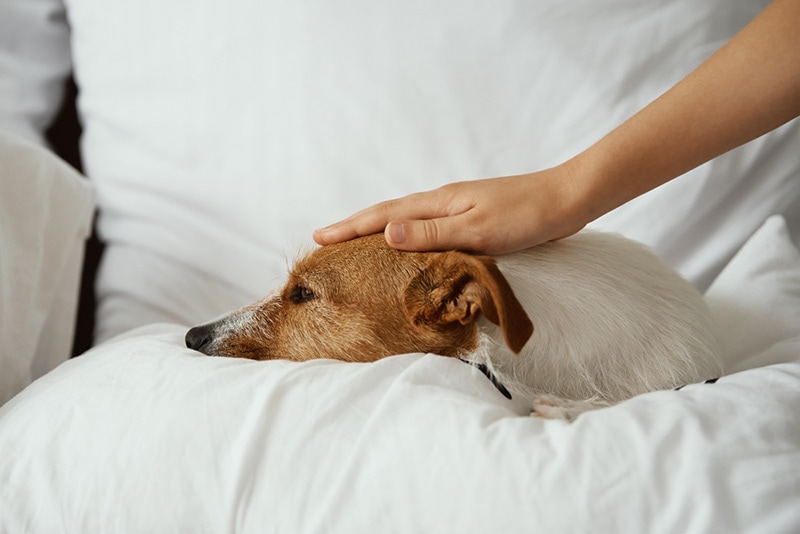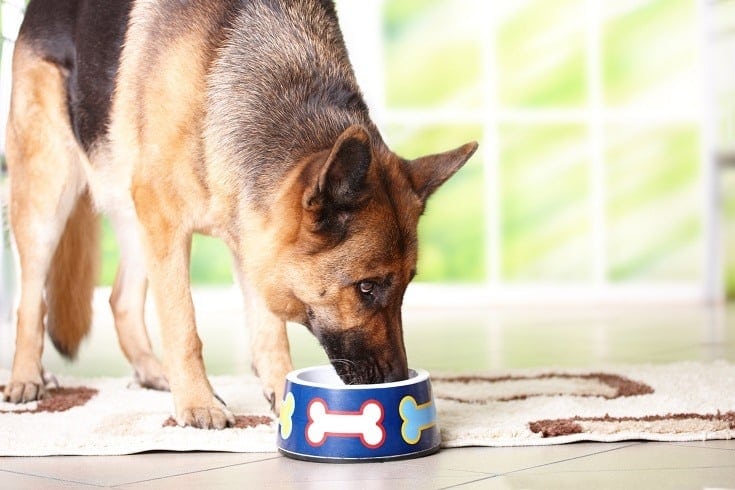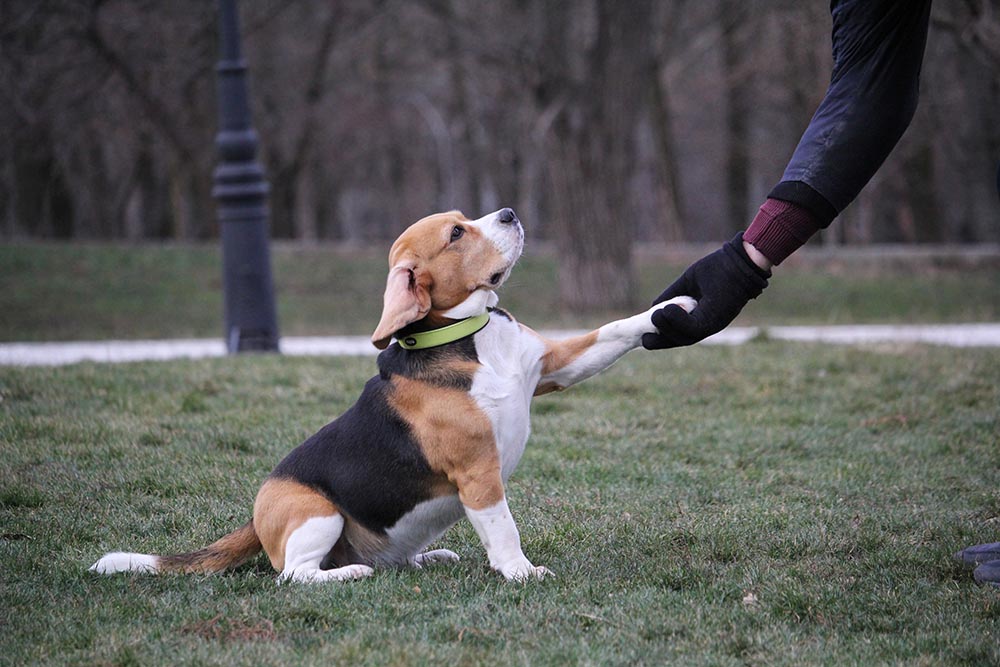Why Is My Dog’s Stomach Hard? 5 Vet Approved Reasons

Updated on

A swollen belly is not always a cause for alarm; it could be your pup ate too much or too fast. That they have gained weight or are pregnant. However, you have a reason to worry if your dog’s belly is swollen, hard and painful. While a healthy dog’s tummy will be soft to the touch, a hard belly is a disconcerting symptom that may indicate a severe underlying problem.
Before we discuss five possible reasons your dog’s tummy is hard, let’s first go through the proper steps to take when checking your dog’s tummy.
How to Check Your Dog’s Stomach
If your dog’s belly seems bloated, you can do a simple physical check to establish whether it’s also hard. A canine’s abdomen begins right behind the ribs, and you can touch this area gently and check for any bumps or lumps.
Next, use your fingers to press onto the belly gently. The left side of the tummy may feel enlarged if your pup has just eaten, although it should not feel hard to the touch.
When examining a healthy canine, you will notice a smooth outline as you run your fingers on the tummy. There will be no distention, masses, bumps, or lumps. Your pup will also seem to enjoy the tummy rub and will not show pain or discomfort during palpation.
However, we do recommend that if you have any concerns about the size or shape of your dog’s abdomen you get a professional assessment with your veterinarian.

The 5 Reasons Why Your Dog’s Tummy Is Hard
Your pup can have a swollen and hard stomach for various reasons, including pregnancy. However, you may be dealing with a life-threatening condition if the canine also exhibits other symptoms like trouble breathing, retching, restlessness, or excessive drooling.
Here are five more serious causes of the hard tummy.
1. Gastric Dilation Volvulus (GDV)
The possibility of GDV and bloating is a common cause for concern in dog owners. The exact mechanism is still not known but it often starts as gas or food bloating and it causes the stomach to twist on its axis. GDV is life-threatening because when the distended stomach rotates, it traps gas and hinders proper blood circulation. The distension worsens and parts of the gastro-intestinal tract lose blood supply. It is often accompanied by non-productive attempts to vomit and eventually collapse. The distention in the abdomen usually occurs quickly rather than over days. It is more common in deep-chested breeds.
Fortunately, seeking prompt medical attention can increase your canine’s survival chances by over 80%. Treatment for GDV generally involves initial procedures to remove the excess gas, manage pain, and stabilize the heart rate. After this, your vet will prepare your pup for abdominal exploratory surgery.

2. Ascites (Abdominal Effusion)
Ascites is a condition characterized by fluid buildup in the abdomen and is usually suspected due to a change in abdomen shape and texture. It can be caused by various illnesses, including abdominal cancer, stomach lining inflammation, impact trauma, liver damage, heart failure, a ruptured bladder, and abdominal bleeding. In most cases the abdominal distention will progress over the course of weeks. However if trauma, such as being hit by a car, is suspected then the distention may happen quickly. Treatment depends on the root cause of the condition.
If your pup is suffering from ascites, it will likely exhibit other symptoms, including loss of appetite, lethargy, vomiting, and abdominal discomfort. Depending on the extent of the concern, your furry friend may also have difficulty breathing caused by pleural effusion (fluid buildup in the area between the lungs and chest walls).
3. Cushing’s Syndrome (Hyperadrenocorticism)
Cushing’s syndrome is a naturally-occurring condition that can be adrenal-dependent or pituitary-dependent. The disease is often caused by a tumor in the pituitary gland (pituitary-dependent) nearly 85% of the time.
When the disease is pituitary-dependent, it manifests when the pituitary triggers an overproduction of adrenocorticotropic hormone (ACTH), which in return causes an overproduction of cortisol. On the other hand, an adrenal-dependent concern is caused by a tumor on the adrenal glands that causes the production of more cortisol than the body needs.
The stomach in this case usually develops a pot bellied appearance over time, is not usually painful and is not rock hard. Cushing’s syndrome also exhibits symptoms like increased appetite and thirst, loss of fur, and panting. Medication is available to treat pituitary-dependent Cushing’s syndrome, although surgery may be necessary if the condition is adrenal-dependent.

4. Peritonitis
Peritonitis is a potentially deadly disease caused by peritoneum inflammation. The peritoneum is the lining of a canine’s abdominal cavity. Generally, the concern occurs because of peritoneal cavity contamination, which can happen because of ingesting a foreign object, a ruptured gastrointestinal tract, intestinal ulcers, post abdominal surgery, etc.
Some symptoms of peritonitis include a firm, swollen and painful tummy with reduced fecal output, low blood pressure, fever, abdominal pain, and vomiting. A concern that arises from a gastrointestinal tract rupture can also cause blood poisoning, shock, and death.
Your pup can survive peritonitis if you seek prompt treatment. Your vet will first address shock, fluid loss, and blood clotting symptoms and administer antibiotics after identifying the root cause. Corrective surgery can help to remove an irritating substance, take out damaged tissue and repair the affected areas.
5. Bowel Obstruction
Bowel obstruction or an intestinal blockage can also cause your pup’s tummy to feel hard. While a complete blockage can show symptoms in just a few hours, a partial blockage could take days before you notice any significant signs. Bowel obstruction can cause death in 3 to 7 days because of complications from reduced blood flow and immobile food and water in the gastrointestinal tract.
An obstruction can happen at any point of the digestive tract, including the esophagus, stomach, or intestines. Depending on the object causing the blockage and the damage it causes, your dog can experience symptoms like loss of appetite, nausea, lethargy, diarrhea, vomiting, and pain when its abdomen is touched.
Intestinal obstructions can be addressed surgically or non-surgically depending on the location of the foreign object, its structure, shape, size, and how long it has remained stuck in the gastrointestinal tract.

FAQ
As vigilant dog owners, you may have noticed abdominal swelling and hardness in your pet and this is a concern that calls for immediate medical advice. Taking quick action can make the difference between your furry friend surviving or dying from the underlying cause of the condition. Here are the answers to some questions frequently asked by concerned pet parents.
How Can I Prevent Stomach Hardness in Dogs?
Even the best pet parent cannot entirely protect their canine from diseases and health concerns. However, the surest way to ensure you catch a problem before it gets out of hand is to take your pup for regular vet checkups. During examinations, the expert will conduct physical exams or use equipment to check for common concerns that affect the stomach, lungs, bowel, heart, and other organs.
Is Gastric Dilatation and GDV the Same?
No. A bloated tummy (gastric dilatation) is often caused by overeating, for example breaking into the food store and trying to eat the whole dog food bag. It can still be serious but is usually easier to treat. Gastric dilatation volvulus (GDV) includes stomach bloating and twisting, making it a potentially deadly condition. This type of bloat is the second biggest killer of canines after cancer. Note that typical food bloats resolve naturally within a few hours but can still require veterinary treatment.
How Do I Prevent Stomach Bloating?
You can prevent tummy bloating by avoiding elevated food and water bowls. Also, keep small objects your pup can eat out of reach because swallowing them can cause blockages. Moreover, ensure your dog eats slowly and does not engage in exercise immediately after a meal.
Final Thoughts
A distended, hard, and painful stomach in canines is often a cause for alarm but the demeanor of your dog will help your vet decide if this is an emergency. If you have any concerns about the health of your dog you should seek veterinary advice quickly. Only a full examination by a veterinarian can achieve a proper diagnosis and prompt treatment of the underlying issue. The information above is only that, and the information is not intended to help you diagnose problems at home. Several concerns that cause a hard, painful stomach are potentially life-threatening, making it imperative not to take a “wait and see” approach.
Featured Image Credit: Tursk Aleksandra, Shutterstock














